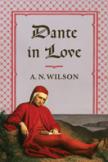Exile From Paradise
How many Catholics have read the greatest literary work in their tradition? Many begin Dante’s Divine Comedy but never quite make it out of hell. They never breathe the bracing air of Mount Purgatory or hear the music in Paradise’s luminous, communal beatitude. As A. N. Wilson puts it, “Such readers are prepared to take on trust that Dante is a great poet, but they leave him as one of the great unreads. And in so doing, they leave unsavoured one of the supreme aesthetic, imaginative, emotional, and intellectual experiences on offer.” In his latest book, the prolific British biographer and novelist has written a work “specifically designed” for these readers. As one who teaches the Commedia and shares Wilson’s love for the Divine Comedy, I judge his effort a success. His intermittent emphasis on the centrality of love for Dante will invite any reader who wishes to join the poet on a pilgrimage meant to end in heaven. For Dante’s journey is not just his but ours; his poem is “for everybody and about everybody.”
Granted, Dante’s medieval context can feel pretty distant, but Wilson relates the biographical and historical background with clarity and brio. In 1265, Dante was born in Florence, a city violently divided between two factions, the “new money,” pro-papal Guelfs and the aristocratic, pro-empire Ghibellines. But even these parties were divided: Dante, politically ambitious, was a member of the White Guelfs, who resisted Pope Boniface VIII’s increasing consolidation of political power. Politically ambitious, Dante was elected a member of the city’s priory in 1300 and chose to vote against the pope’s request for Florentine military assistance, thus inspiring the pope’s enmity. By 1302, Dante was exiled from Florence and family, and remained dependent upon the hospitality of patrons until his death in Ravenna in 1321.
But without Dante’s exile we would not have the Commedia, to which Dante dedicated the last part of his life. True, even in his youth, Dante was an accomplished poet, crafting sonnets “perfectly made, like wonderfully carpentered furniture.” In these early works, Dante “cut his teeth” on the courtly love tradition. In an intriguing if sometimes puzzling chapter, Wilson links the frustrated eros of courtly love—in which the lover venerates and serves his married lady from a distance—with the Catharite heresy and its ascetic abhorrence of the flesh. Wilson rightly clams that “the mature Dante” rejects the angelism implicit in this rejection, and observes that when Dante recalls and dreams of Beatrice—the Florentine girl with whom he fell in love and who becomes his guide in Paradise—he is “aware of the body beneath the dress.”
Wilson’s emphasis upon the incarnational in Dante is accurate, but it sometimes leads him to questionable readings. For example, in Inferno’s circle of the wind-blown lustful, Francesca describes her love affair, the catalyst for which is the love poetry she reads with Paolo, her infernal companion. Wilson describes this passage as “the most subversive of the very doctrine of hell” as it “venture[s] the possibility that in loving a woman, a man is not turning away from God but towards Him; that the meaning of Incarnation was that men and women, in the flesh as well as in the spirit, became like Christ.” Dante’s incarnational art does affirm this possibility—but not through adultery. The pilgrim’s swooning sympathy for the lovers is critiqued by Dante the poet.
Wilson confesses his admiration for an earlier commentator on Dante, Charles Williams, “who believed the Church was still not ready” for a Dante “who believed that what he felt for this Italian teenager [Beatrice] was part of, or identifiable with, the Love which moved the stars.” But it is not as if Williams does not have company in the Catholic tradition. As Pope Benedict XVI’s first encyclical, “Deus Caritas Est,” makes clear, eros and agape are joined in the Christian experience of love.
Wilson’s love for the poet does not restrain him from noting his faults. Dante’s hatreds could lead him into theological blunders: why is the still-living Branco d’Oria freezing in the pit of hell? Dante’s political enthusiasms could verge on madness: Holy Roman Emperor Henry VII would never redeem the Holy Roman Empire, despite Dante’s counsel. Wilson is especially harsh in his judgment of Dante’s treatment of his best friend and poetic mentor, Guido Cavalcanti. In 1300, at the height of Dante’s political power, he voted to have Guido exiled, which led to his death by malaria. “It is extraordinary [that] by the time Dante reaches Purgatory...he presents Guido purely as a rival to be supplanted, not as a friend to be mourned.”
Dante in Love is sumptuously illustrated with color plates, some of them works by Giotto, Dante’s fellow Florentine. Their friendship was fruitful: “Dante saw that what Giotto had done in paint could also be done in literature. The great drama of Christian theology could be peopled with [persons] he had known, just as Giotto used contemporary models for his Biblical figures.” In a later chapter, Wilson notes Dante’s affinity with St. Augustine: as an autobiographer, he tells the story of his life for its “universal application”; as a mystic, he knows “that the heart will find no rest until it rests in God.”
In his conclusion, Wilson makes a case that Dante’s prophetic critique of fractured 14th-century Europe holds relevance as we reflect on our own fragmented culture. Certainly, Wilson’s emphasis upon Dante’s incarnational vision makes for timely reading during the Christmas and Epiphany seasons. His book will be a worthy addition to any pilgrim’s pack—that is, to any reader determined to go the distance with Dante, and willing to be moved by “the Love that moves the sun and other stars.”
This article also appeared in print, under the headline “Exile From Paradise,” in the January 16, 2012, issue.








